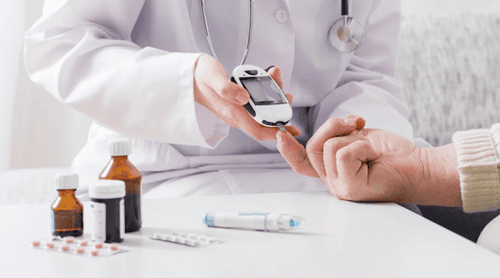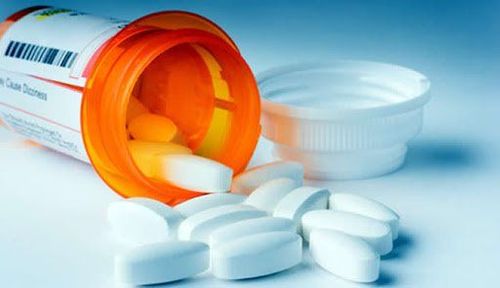This is an automatically translated article.
Diabetes is a disease characterized by an increase in blood sugar levels. Many patients often worry and wonder if eating sugar causes this condition or not? It is true that large amounts of added sugar can increase the risk of diabetes, but whether small amounts have an effect on diabetes risk is controversial.
1. What is diabetes?
Diabetes occurs when the body is no longer able to effectively regulate blood sugar levels. This can be because the pancreas stops making insulin, or because the cells become different from insulin, or both.
Insulin is a hormone needed to transport sugar from the blood into the cells. Therefore, both insulin deficiency and insulin resistance lead to persistent elevation of blood glucose.
High blood sugar for a long time can lead to complications of diabetes such as increased risk of cardiovascular diseases, nerve and kidney damage. Therefore, blood sugar control is extremely important in patients with diabetes.
Diabetes is divided into two main groups based on the cause:
Type 1 diabetes: Occurs when the immune system attacks the body's pancreas, making it unable to produce insulin. The pancreas produces enough insulin, but the cells no longer respond to the insulin produced. Type 1 diabetes is relatively rare, largely due to genetic causes, and accounts for about 5-10% of all diabetes cases. This article will mainly focus on type 2 diabetes, which accounts for 90% of all diabetes cases and is mainly triggered by dietary and lifestyle factors.
2. How is sugar metabolized?
Daily sugar is mainly sucrose or refined sugar made from sugar beets or from sugar cane. Sucrose is made up of one glucose molecule and one sucrose molecule linked together. When sucrose is used, the glucose and fructose molecules are broken down by enzymes present in the small intestine before being absorbed into the bloodstream. From there, blood sugar levels will rise, stimulating the pancreas to release insulin. Insulin is responsible for transporting glucose into cells and then converted into energy. As for fructose, a small amount is absorbed by the cells and used for energy. However, most is transported to the liver and converted to glucose or fat for storage.

Đường được sử dụng hàng ngày chủ yếu là đường tinh luyện
If using a lot of sugar will lead to excess energy in the body, this excess will be converted into fatty acids and stored as body fat. Because fructose can be converted to fats, high intakes tend to increase triglyceride levels, which increases the risk of cardiovascular disease and fatty liver.
High levels of fructose are also associated with higher blood uric acid levels. If these uric acid crystals are deposited in the joints, it will lead to gout.
3. Does sugar increase the risk of diabetes?
Large studies show that people who regularly drink sugary drinks have an approximately 25% higher risk of developing diabetes. In fact, drinking a sugary beverage increases your risk of diabetes by 13%, regardless of whether the sugar has a weight-gain effect or not.
In addition, countries with high sugar consumption also have higher rates of type 2 diabetes, and vice versa, low diabetes rates in countries with low sugar consumption. Furthermore, the association between sugar intake and diabetes remained constant even when controlling for calorie intake, weight, limiting alcohol use, and exercising.
However, the researchers stress that this study does not prove that sugar causes diabetes. Sugar is considered a direct as well as an indirect risk factor for diabetes.
4. Does natural sugar cause diabetes?
Natural sugar is the sugar found in fruits and vegetables and has not been added to the production or processing process. Because these sugars are laden with fiber, water, antioxidants, and other nutrients, they are digested and absorbed more slowly, less likely to cause blood sugar spikes.
For example, a peach has about 8% sugar by weight, while a Snicker candy bar contains 50% sugar by weight.
Some studies show that consuming one serving of fruit per day reduces the risk of diabetes by 7% to 13% compared with no use.
5. Does fruit juice increase the risk of diabetes?
Research is still controversial about the use of whole fruit juices increasing the risk of diabetes.
Some studies show an association between drinking juice and diabetes in developed countries because of the high sugar content and low fiber content in juice. However, others have not been shown to increase the risk of diabetes with fruit juice consumption. Therefore, more studies are needed to prove this association.

Nước ép trái cây có liên quan đến bệnh tiểu đường
6. Do natural sweeteners increase the risk of diabetes?
Although some natural sweeteners like honey or maple syrup don't usually go through the same amount of processing as table sugar or corn syrup, they're still considered a pure sugar. because it does not contain fiber.
These products contain large amounts of sucrose and fructose and are still considered processed sugars. Many other sweeteners marketed are of natural origin but should still be considered added sugars such as coconut or cane sugar.
Therefore, these natural sweeteners should be used in moderation as added sugars and should make up less than 10% of total calories per day.
7. Do artificial sweeteners increase the risk of diabetes?
Artificial sweeteners are substances that have a sweet taste and are not converted into energy. Although these sweeteners do not raise blood sugar, they are still associated with insulin resistance and type 2 diabetes. Drinking a can of soda can increase the risk of type 2 diabetes by 25-67%. 2 compared to non-drinkers.
The cause is still unclear and many theories have been proposed. It is possible that artificially sweetened products increase cravings for sweets leading to increased consumption of sugary foods and greater weight gain, increasing the risk of diabetes.
Another theory, the brain has a link between sweetness and calorie intake. Because these substances use but do not produce energy, the brain will stimulate calorie compensation through the addition of calories from other food sources.
Some studies show that sweeteners can alter the number and type of microorganisms in the gut, which may contribute to impaired glucose tolerance, weight gain, and diabetes.
Although there are many studies between sweeteners and diabetes, more well-designed studies are needed to prove this association.
8. Some other risk factors for diabetes
High sugar consumption is associated with an increased risk of diabetes, but this is not the only risk factor, it is a combination of many other factors such as:
Weight: Research shows One of the main risk factors for diabetes is obesity. A 5-10% reduction in body weight reduces this risk. Exercise: People who lead a sedentary lifestyle are nearly twice as likely to develop type 2 diabetes as those who are active. Just 150 minutes of exercise a week can reduce the risk of diabetes. Smoking: Smoking more than 20 cigarettes a day doubles the risk of diabetes. When you quit smoking, this risk will return to normal. Sleep Apnea Syndrome: This is a condition where breathing becomes blocked during sleep that is a risk factor for diabetes. Genetics: The risk of developing type 2 diabetes is 40% if you have a parent with diabetes and 70% if both parents have diabetes.

Hút thuốc lá làm tăng gấp đôi nguy cơ mắc bệnh tiểu đường
9. How to eat to reduce the risk of diabetes?
Besides reducing added sugars, there are many dietary changes that can help reduce your risk of diabetes:
Diet : A diet rich in nuts, fruits, vegetables, and whole grains helps reduce your risk of diabetes. chance of diabetes. Drinking coffee: Drinking coffee reduces the risk of type 2 diabetes. Drinking one cup of coffee a day reduces the risk of diabetes by 7%. Eat more green vegetables: A diet rich in green vegetables can reduce the risk of diabetes by 14%. Limit alcohol If it is difficult to limit added sugars, you can start by reducing the amount of sugary drinks that are the main source of sugar in the diets of patients at risk of diabetes. Street. Check the nutritional components in each food to help control calories and sugar intake, which contributes to reducing the risk of diabetes.
Please dial HOTLINE for more information or register for an appointment HERE. Download MyVinmec app to make appointments faster and to manage your bookings easily.
Article referenced source: healthline.com












